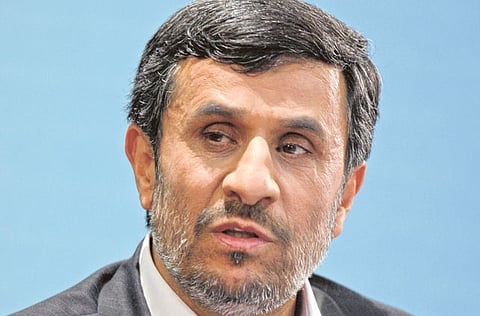Brothers in arms?
For Ahmadinejad and his Latin American hosts, the main purpose of his visit to South America would seem to be political theatre

There are not many places in the world these days where Iran's President Mahmoud Ahmadinejad can count on red-carpet treatment. So his five-day visit recently to Latin America was an opportunity to show that Iran still has some allies, even as Europe and the United States prepare to tighten sanctions against the Islamic Republic.
He called on his longstanding friend, Venezuela's Hugo Chavez, and joined him at the inauguration of Daniel Ortega for a constitutionally dubious third presidential term in Nicaragua, before flying on to Cuba and Ecuador.
It was Ahmadinejad's fifth trip to the region since 2005, and has inflamed fears in the US that Iran may be building a terrorist network on its doorstep. There is no clear evidence of that. Indeed, the signs are that Iranian influence in the region is decreasing. His hosts this time are confined to members of Chavez's anti-American ALBA alliance. In 2009 Ahmadinejad also visited Brazil. But Dilma Rousseff, Brazil's new president, has been far more critical of Iran than her predecessor, Luiz Inacio Lula da Silva.
The Obama administration, to the ire of many in the Republican Party, has downplayed the potential threat posed by Venezuela's alliance with Iran. It gently warned that "now is not the time to be deepening ties". But it also chose the occasion to expel the Venezuelan consul in Miami, Livia Acosta, who was accused in a documentary aired last month by Univision, a Spanish-language American channel, of involvement in an alleged cyber-plot against the US featuring Iranian diplomats and Mexican computer hackers.
Chavez called the report ‘lies' and the expulsion ‘bullying'. As ever, he and Ahmadinejad swore eternal friendship. What does that amount to? The two governments have signed hundreds of agreements, on everything from agriculture to tourism. But the most visible initiatives have flopped. Typical is a cement factory in the eastern state of Monagas. Due to open in 2007 and produce 1million tonnes a year, it is still under construction.
Chavez claims Iran has built 14,000 prefabricated houses. Not for the workers building the cement plant, who recently staged a protest over claims by a chavista union leader that they were well housed.
Suspicion attaches to agreements under which Venezuela might potentially help Iran evade sanctions over its nuclear programme. After Iran's Export Development Bank set up a subsidiary in Caracas in 2007, the US Treasury department imposed sanctions on it. Last year the Treasury applied largely symbolic sanctions against PDVSA, Venezuela's state oil company, for exporting refined products to Iran. (The US continues to be PDVSA's main export market.) Venezuela denies that it is mining uranium or exporting it to Iran.
Asymmetric warfare
The murkiest areas are military and intelligence links, including the alleged presence in Venezuela of the Quds force, the foreign arm of Iran's Revolutionary Guard. Some American analysts claim that Lebanon's Hezbollah, an Iranian ally, is involved in cocaine trafficking from Latin America. Under Chavez, Venezuela's armed forces have adopted the doctrine of "asymmetric warfare", which explicitly endorses acts of terrorism in the event of an American attack.
But there is little reason to believe that Chavez would risk international isolation by allowing Iran to launch attacks against American targets from Venezuela.
Manochehr Dorraj, of the Texas Christian University and the co-author of a forthcoming book on the two countries, says that Chavez's solidarity would be "likely to take primarily a political form even in the case of a military attack [on Iran]". For Ahmadinejad and for his Latin American hosts, the main purpose of his visit would seem to be political theatre.
—


